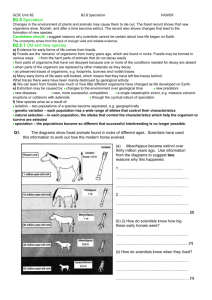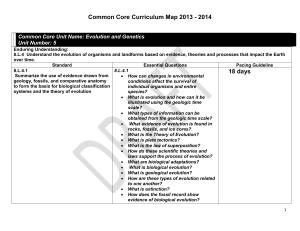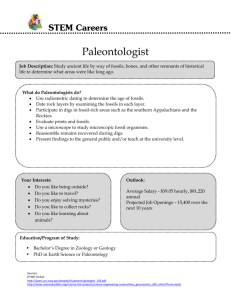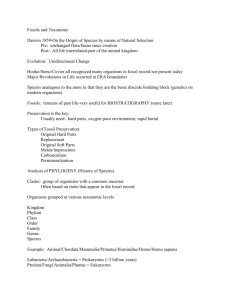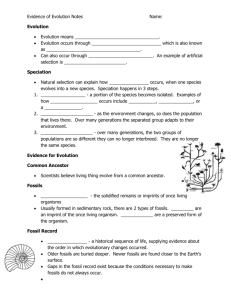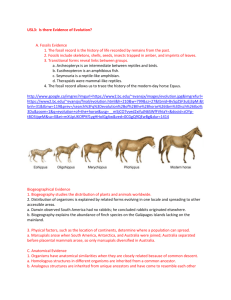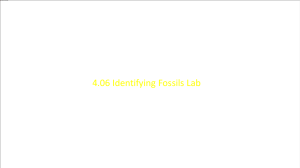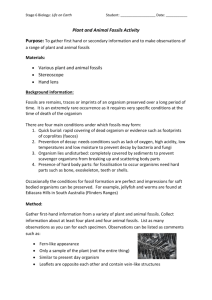B2.8 Topic outcome sheet
advertisement
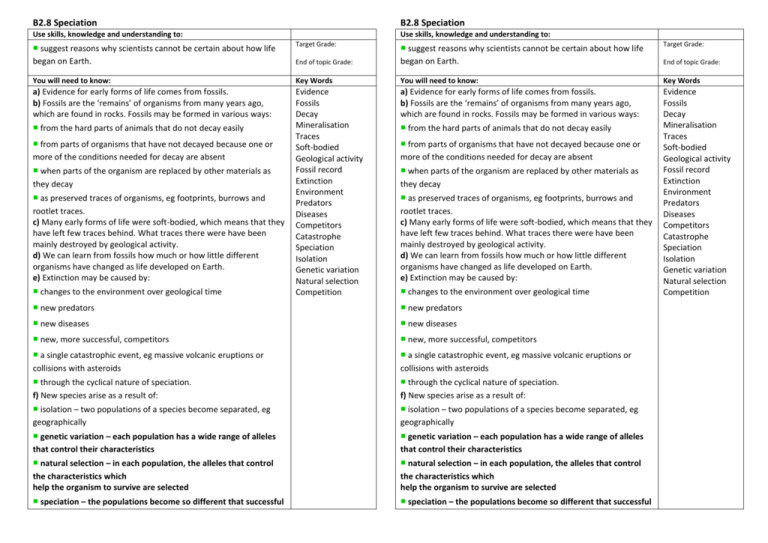
B2.8 Speciation B2.8 Speciation Use skills, knowledge and understanding to: Use skills, knowledge and understanding to: ■ suggest reasons why scientists cannot be certain about how life began on Earth. Target Grade: Target Grade: End of topic Grade: ■ suggest reasons why scientists cannot be certain about how life began on Earth. You will need to know: Key Words You will need to know: Key Words a) Evidence for early forms of life comes from fossils. b) Fossils are the ‘remains’ of organisms from many years ago, which are found in rocks. Fossils may be formed in various ways: Evidence Fossils Decay Mineralisation Traces Soft-bodied Geological activity Fossil record Extinction Environment Predators Diseases Competitors Catastrophe Speciation Isolation Genetic variation Natural selection Competition a) Evidence for early forms of life comes from fossils. b) Fossils are the ‘remains’ of organisms from many years ago, which are found in rocks. Fossils may be formed in various ways: Evidence Fossils Decay Mineralisation Traces Soft-bodied Geological activity Fossil record Extinction Environment Predators Diseases Competitors Catastrophe Speciation Isolation Genetic variation Natural selection Competition ■ from the hard parts of animals that do not decay easily ■ from parts of organisms that have not decayed because one or more of the conditions needed for decay are absent ■ when parts of the organism are replaced by other materials as they decay ■ as preserved traces of organisms, eg footprints, burrows and rootlet traces. c) Many early forms of life were soft-bodied, which means that they have left few traces behind. What traces there were have been mainly destroyed by geological activity. d) We can learn from fossils how much or how little different organisms have changed as life developed on Earth. e) Extinction may be caused by: ■ changes to the environment over geological time ■ from the hard parts of animals that do not decay easily ■ from parts of organisms that have not decayed because one or more of the conditions needed for decay are absent ■ when parts of the organism are replaced by other materials as they decay ■ as preserved traces of organisms, eg footprints, burrows and rootlet traces. c) Many early forms of life were soft-bodied, which means that they have left few traces behind. What traces there were have been mainly destroyed by geological activity. d) We can learn from fossils how much or how little different organisms have changed as life developed on Earth. e) Extinction may be caused by: ■ changes to the environment over geological time ■ new predators ■ new predators ■ new diseases ■ new diseases ■ new, more successful, competitors ■ new, more successful, competitors ■ a single catastrophic event, eg massive volcanic eruptions or collisions with asteroids ■ a single catastrophic event, eg massive volcanic eruptions or collisions with asteroids ■ through the cyclical nature of speciation. f) New species arise as a result of: ■ through the cyclical nature of speciation. f) New species arise as a result of: ■ isolation – two populations of a species become separated, eg geographically ■ isolation – two populations of a species become separated, eg geographically ■ genetic variation – each population has a wide range of alleles that control their characteristics ■ genetic variation – each population has a wide range of alleles that control their characteristics ■ natural selection – in each population, the alleles that control the characteristics which help the organism to survive are selected ■ natural selection – in each population, the alleles that control the characteristics which help the organism to survive are selected ■ speciation – the populations become so different that successful ■ speciation – the populations become so different that successful End of topic Grade:
